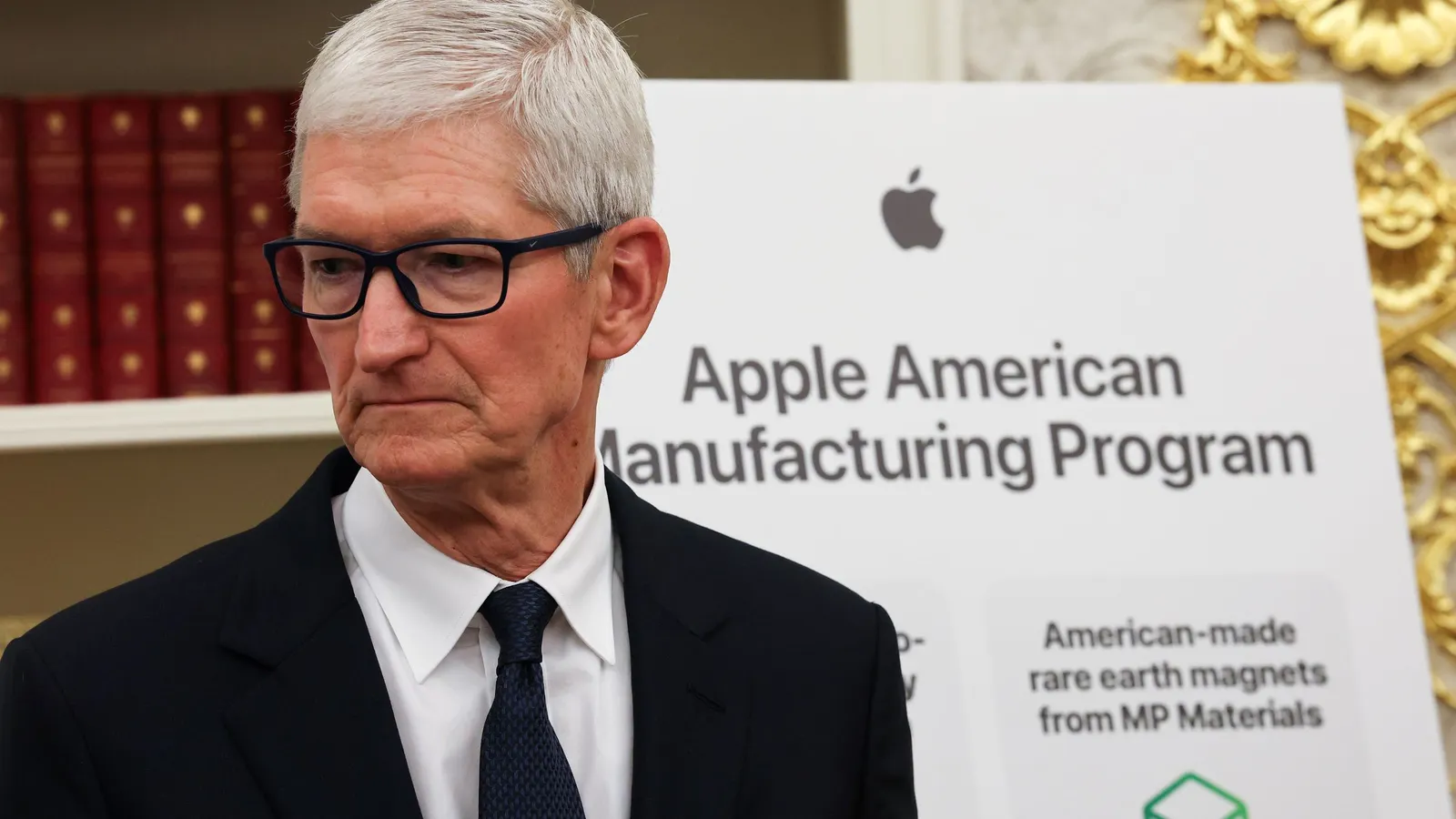Nárůst investic do výroby v USA
Apple oznámil významné rozšíření svého závazku k výrobě ve Spojených státech, a to investicí dalších $100 miliard do zařízení v deseti státech. Tato investice je strategickou reakcí na rostoucí provozní náklady, u kterých technologický gigant předpokládá, že dosáhnou téměř $2 miliarda vzhledem k nákladům spojeným s tarify.
Zahájení programu americké výroby
Společnost rovněž představuje program American Manufacturing Program, jehož cílem je přilákat zpět do tuzemska větší část jejího dodavatelského řetězce. Tato iniciativa má povzbudit mezinárodní dodavatele k založení provozoven v USA.
Souběžně s tím plánuje společnost Apple během následujících čtyř let přijmout 20 000 nových zaměstnanců v USA, přičemž se zaměří především na role ve výzkumu a vývoji, návrhu čipů, vývoji softwaru, umělé inteligenci a strojovém učení.
Strategické poznatky o expanzi výroby
S nedávným oznámením přesáhla celková investice společnosti Apple do výroby v USA za poslední roky $500 billion. Během nedávné události zdůraznil generální ředitel společnosti Apple Tim Cook okamžité výhody z počátečního závazku učiněného začátkem tohoto roku.
Pozoruhodné je, že byla zahájena výstavba nového zařízení v Houstonu, které je zaměřeno na výrobu serverů s umělou inteligencí. Po vyrobení první testovací jednotky se předpokládá, že toto zařízení dosáhne masová produkce do roku 2026.
Dopad cel na provoz
Navzdory značným finančním závazkům čelí společnost Apple neustálým hrozbám ohledně cel, která ovlivňují její produkty. Například nedávné prohlášení bývalého prezidenta naznačovalo potenciální cla až do výše 25 % na produkty společnosti Apple, což zdůrazňuje zásadní potřebu domácí výroby.
Posílení místních partnerství
Společnost Apple vyčlenila, aby posílila svůj program American Manufacturing. $2.5 billion konkrétně vyrábět všechna krycí skla pro svá zařízení, jako jsou iPhony a Apple Watch, v závodě společnosti Corning v Kentucky. Toto partnerství zcela změní zaměření společnosti Corning na produkty společnosti Apple.
Plány jsou také v pohybu pro zřízení Inovačního centra Apple-Corning v Harrodsburgu, které se zaměří na vývoj pokročilých materiálů a výrobních platforem pro budoucí produkty Apple.
Vytvoření komplexního dodavatelského řetězce křemíku
Iniciativa se rozšiřuje na vytvoření kompletního dodavatelského řetězce křemíku, a to prostřednictvím partnerství s několika významnými výrobci polovodičů a komponentů v USA. Mezi počáteční aliance patří významné společnosti jako Coherent, GlobalWafers America, Applied Materials, Texas Instruments, Samsung a GlobalFoundries, které všechny ohlásily vlastní expanze v řádu miliard dolarů a podporu pro operace přesunu výroby zpět do vlasti.
Závazek vůči místním dodavatelům
Závazek společnosti Apple si klade za cíl posílit podporu amerických dodavatelů v každé fázi procesu výroby polovodičů. Provozní ředitel Sabih Khan uvedl, že se zavázali pomáhat americkým dodavatelům ve všech fázích a zdůraznil, že je důležité udržet si vedoucí postavení v tomto odvětví.
Tento výrobní program posiluje předchozí dohodu společnosti Apple s MP Materials, dodavatelem a zpracovatelem materiálů ze vzácných zemin, a zvyšuje výrobní kapacity v USA.
Vyváženost výrobních lokací
Jak poznamenal Cook, ačkoli se mnoho komponentů bude vyrábět v USA, finální montáž produktů společnosti Apple bude ještě nějakou dobu probíhat v zahraničí. Historicky probíhala většina hardwarové produkce společnosti Apple v zemích jako Čína, Indie, Japonsko, Jižní Korea, Tchaj-wan a Vietnam.
Probíhající projekty rozšíření
Kromě výroby rozšiřuje Apple své kapacity datových center, zejména v Maiden v Severní Karolíně, kde je vyvíjeno nové zařízení pro posílení podpory severoamerických uživatelů. Tato expanze navazuje na předchozí investici více než 1,45 miliardy věnováno této stránce.
Apple navíc staví druhý kampus v Austinu v Texasu, který bude zahrnovat tři budovy věnované výzkumným a vývojovým laboratořím, které uspokojují hardwarové i softwarové inženýrské týmy.
Vzdělávací iniciativy ve výrobě
Společně s Michigan State University, Apple se chystá zahájit provoz Apple Manufacturing Academy. Tento program, který je součástí širší iniciativy Applu v oblasti výroby, si klade za cíl posílit malé a střední podniky zlepšením provozní efektivity.
Potenciální globální logistické dopady
Důsledky investice společnosti Apple by se mohly projevit v globální logistice, zejména v tom, jak se dodavatelé a výrobci přizpůsobí novým strategiím domácí produkce. I když bezprostřední dopady nemusí být celosvětově ohromující, signalizují významný posun v dynamice dodavatelského řetězce, který by mohl ovlivnit logistické operace po celém světě.
S tím, jak se Apple snaží integrovat více místních dodavatelských řetězců, se logistické společnosti možná budou muset přizpůsobit složitějším distribučním sítím a zároveň zajistit rychlejší dodací lhůty, aby uspokojily místní poptávku. To vytváří nové příležitosti pro platformy, které upřednostňují efektivní a spolehlivou přepravu, jako je například GetTransport.com, nabízející cenově dostupné globální řešení nákladní dopravy šitá na míru firmám.
Závěr
Robustní rozšiřování výroby společnosti Apple představuje klíčový moment v přetváření jejího dodavatelského řetězce a podpoře místních partnerství. Potenciální dopady na logistiku by mohly přinést nové příležitosti pro společnosti, které se zavázaly ke spolehlivým řešením v oblasti dopravy. Vzhledem k tomu, že podniky reagují na vyvíjející se dynamiku, platformy jako GetTransport.com jsou připraveny uspokojit různorodé logistické potřeby, od stěhování domácností po přepravu těžkých nákladů, a zajistit tak transparentnost a pohodlí v celém procesu.
Vzhledem k pohodlí a dostupnosti GetTransport.com pro vaši logistiku, ať je vaše příští přeprava bezproblémová a efektivní. Rezervujte si ji nyní s GetTransport.com.

 Apple posiluje závazek k výrobě v USA příslibem 100 miliard dolarů">
Apple posiluje závazek k výrobě v USA příslibem 100 miliard dolarů">